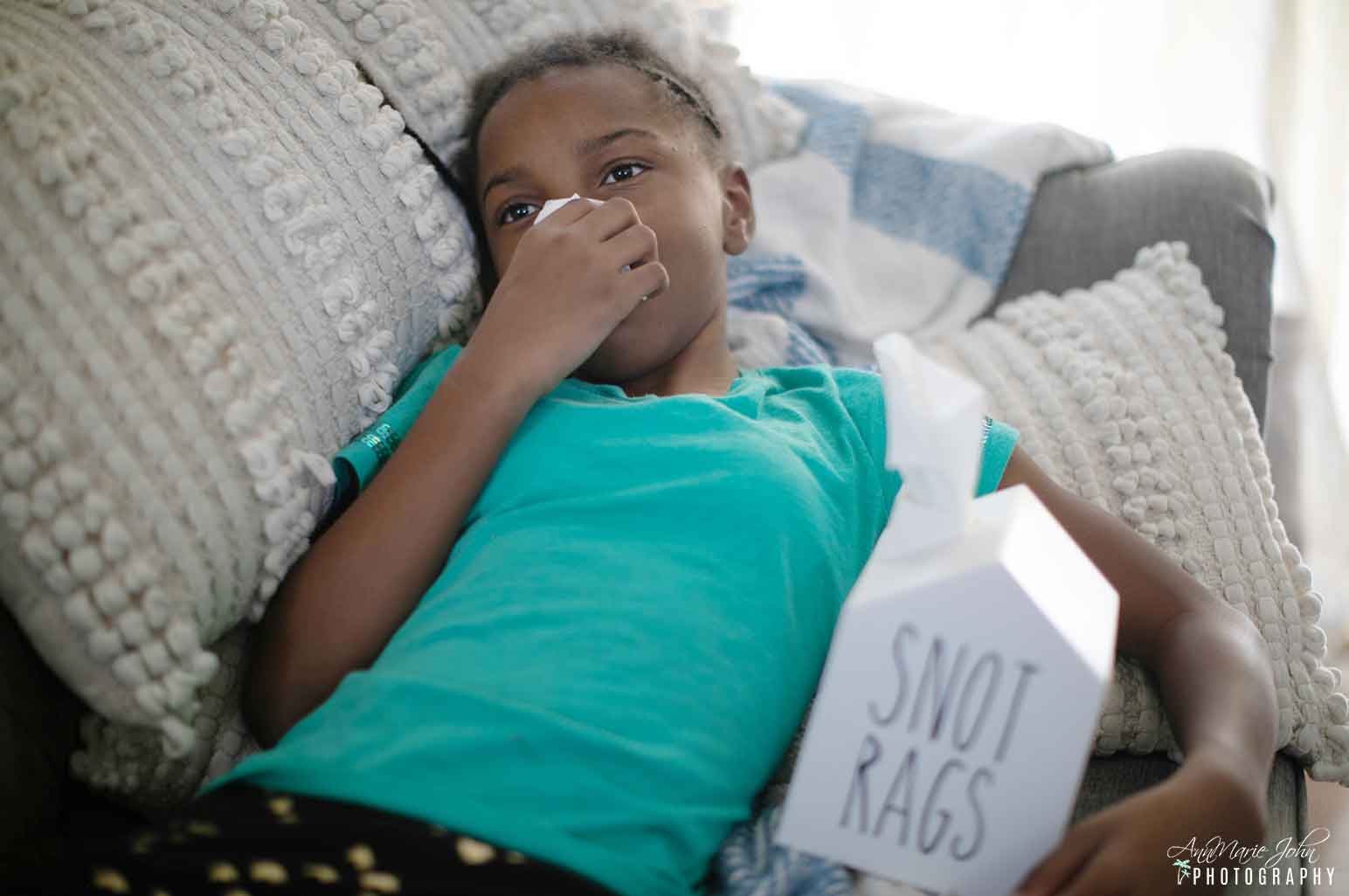Fall is here, and you know what that means. Back-to-school season – which quickly transitions into cold and flu season. While some people take flu season seriously every year, others shake their heads at the thought of a flu shot and hope they make it through unscathed.
I’m here to tell you that everyone should be concerned about the flu – especially now. And especially if you’re the parent of a young child, which is one of the reasons I decided to partner with Med-IQ for this post.

Why? We’ll start by looking at the numbers. Last year, the CDC estimated we saw:
- 38-54 million flu illnesses
- 17-25 million flu-related medical visits
- 390,000-710,000 hospitalizations
- up to 59,000 deaths due to flu-related complications
These aren’t small numbers. And, sadly, many of those cases can be tied to kids. Young children actually make up the largest proportion of people visiting the doctor for influenza-related care, and an estimated 6% to 12% of all children seek care for influenza-related illnesses each year.
Not only that, but young children – especially those under the age of 2 – are at high risk of developing some serious flu-related complications, including pneumonia, myocarditis, encephalitis, myositis, multiple organ failure, and sepsis. And 41% of all children diagnosed with the flu have some kind of complication, ranging from asthma exacerbation and sinusitis to seizures or pneumonia.
That’s why it’s important to…
FIGHT THE FLU: KNOW THE SIGNS
One of the best things you can do to prepare your family for flu season is to familiarize yourself with the symptoms. Many parents have a hard time discerning between the flu and the common cold – and now, we have to consider COVID-19 as well. But diagnosing and treating the flu quickly in young children can be key to preventing further complications, some of which are pretty serious.
Unfortunately, it isn’t very easy. There isn’t a ton of consistency when it comes to flu-related symptoms. Some people demonstrate a few mild symptoms. Others demonstrate symptoms so aggressively they end up in the hospital.
And some even test positive for the flu but don’t actually exhibit any symptoms at all. Like COVID-19, there are asymptomatic flu carriers.
Many of the symptoms parents are encouraged to watch for are shared between the flu and COVID-19, including:
- Fever or chills
- Shortness of breath
- Cough
- Fatigue
- Sore throat
- Runny or stuffy nose
- Muscle pain or body aches
- Headache
- Vomiting and diarrhea – more common in children than adults
Because of this, many parents have wondered – what’s the difference between COVID-19 and the flu? There are a few key differences:
- Flu symptoms typically show up 1 to 4 days after infection. COVID-19 symptoms typically appear 5 days after infection – but can happen as quickly as 2 days post-infection and as late as 2 weeks after infection.
- Some symptoms are unique to each sickness. For instance, loss of taste and smell is distinct to COVID-19.
- The risk of developing severe illness is higher among kids with the flu.
- Kids COVID-19 are at higher risk of Multisystem Inflammatory Syndrome in Children (MIS-C), a rare but severe complication of COVID-19.
Here are just a few signs your child likely has the flu – not a cold:
- More rhinorrhea and nasal congestion
- Cough and fever within 48 hours of symptom onset
- Experiencing a cough, headache, and pharyngitis at the same time

WHEN SHOULD I SEEK MEDICAL CARE FOR THE FLU?
Figuring out when to go to the doctor for flu treatment can be tricky. After all, many children – and adults – experience the flu each year and recover just fine without any medical intervention.
While there’s a good chance you can make it through the flu without taking your little one in for a check-up, it’s not advised. There’s no harm in scheduling a visit – virtual or in-person – with your pediatrician to make sure all is well.
If you experience any of the following symptoms, however, it’s critical to see a doctor ASAP:
- Fast breathing or trouble breathing
- Bluish lips or face
- Ribs pulling in with each breath
- Chest pain
- Severe muscle pain (child refuses to walk)
- Dehydration (no urine for 8 hours, dry mouth, no tears when crying)
- Not alert or interacting when awake
- Seizures
- Fever above 104°F
- In children less than 12 weeks, any fever
- Fever or cough that improves but then returns or worsen
- Worsening of chronic medical conditions
In many cases, time is of the essence. Waiting too long to get an appropriate diagnosis and treatment can cause potentially life-threatening complications for your child.

HOW TO PREVENT AND TREAT THE FLU
Given the scary list of symptoms and complications the flu can present, it’s easy to see why we want to avoid the flu at all costs. The best way to boost your family’s chances of avoiding influenza is through a flu shot early in the fall. Vaccination is the most effective means of preventing the flu for anyone over 6 months old.
Aside from vaccines, other steps you can take to prevent the flu look very similar to COVID-19 prevention activities. Wash your hands regularly, use hand sanitizer when you can’t, and keep your distance from others.
What if, despite your best efforts, your child does catch the flu? What can you do to make them feel better? Over-the-counter treatments can help alleviate some symptoms but aren’t the perfect solution. And antibiotics won’t work, since the flu is a virus.
But there are antiviral drugs that can help your child overcome the flu in record time. Antivirals can shorten the amount of time symptoms are experienced and reduce the severity of those symptoms. However, they’re most effective when taken within 48 hours of symptom onset – which means you’ve got to identify your child’s sickness quickly and get them to a doctor, stat!
Antiviral treatment is specifically recommended for anyone with the flu (suspected or confirmed) who is hospitalized, severely ill, or is at higher risk for flu-related complications – which includes children younger than five.
LEARN MORE ABOUT THE FLU
As flu season approaches, many parents – myself included – are seeking information on how to best prepare our families. However, it’s important to be careful when researching online. There’s a lot of wrong, misleading, or downright malicious information out there.
If you have questions about the flu or steps you can take to keep your family healthy, the best thing to do is have a conversation with your doctor.
I’m no doctor, but I am a parent. I understand the risks flu season presents, especially to families with young children. I encourage Moms and Dads everywhere to read up on flu symptoms, take steps to keep your children healthy and advocate for your child’s treatment if they happen to get sick.
*Med-IQ is conducting an anonymous survey and would appreciate your input. The survey, which includes additional education on this topic, will take less than 10 minutes to complete. Survey responses are shared only in aggregate.
Your responses to these survey questions will provide Med-IQ with important information about your views on and experience with pediatric flu.
Once you’ve completed the survey, you will have the option of providing your email address to be entered into a drawing to win 1 of 10 $100 VISA gift cards. If you choose to enter, email addresses are used only to randomly draw the winners and notify them of their prize.
*Links to external sites are provided as a convenience and for informational purposes only. They are not intended and should not be construed as legal or medical advice, nor are they endorsements of any organization. Med-IQ bears no responsibility for the accuracy, legality, or content of any external site. Contact the external site for answers to questions regarding its content.
.
